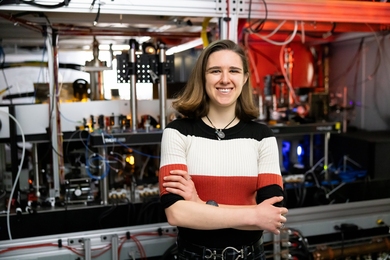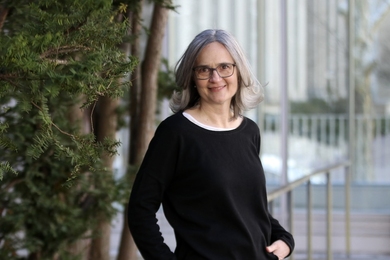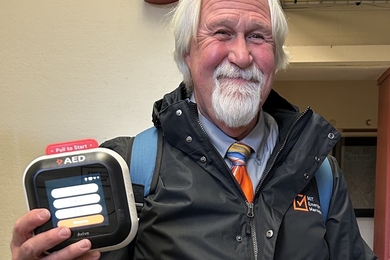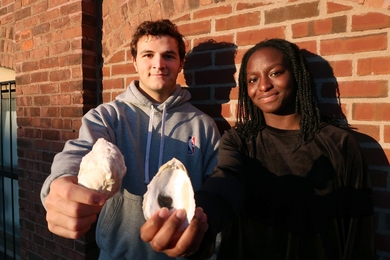Jerome H. Lemelson, one of America's most prolific inventors and founder of the Lemelson-MIT Prize Program, died on October 1 at Cedars-Sinai Hospital in Los Angeles at age 74. Mr. Lemelson, who resided in Incline Village, NV, died of liver cancer, according to his son, Eric.
During a long career that began in the early 1950s, Mr. Lemelson received more than 500 US patents for his inventions. After the Patent Office finishes processing his most recent applications, he will likely have received more patents than any other American except Thomas Edison. His invention includes the drive mechanism for the audio cassette player, the automated warehouse, universal robots, machine vision and flexible manufacturing systems used to make products from integrated circuits to automobiles, the central innovation in the camcorder, and many others in fields ranging from electronics to toys to medical devices.
A native of Staten Island, NY, Mr. Lemelson served in the US Army Air Corps during World War II, designing weapons systems and materials handling equipment for aircraft. He graduated from New York University in 1947 and earned master's degrees in aeronautical and industrial engineering from NYU in 1949 and 1951. Shortly thereafter, he struck out on his own as an independent inventor.
In 1954, Mr. Lemelson filed for his first patents, though many of his inventions were not in widespread use for decades. He recently remarked that the Patent Office rejected his first attempt to patent the camcorder in 1977, because the examiner said it was ridiculous to think that video recorders could be miniaturized to the size required for portability.
Almost alone among independent inventors, Mr. Lemelson made a living solely from royalties from his inventions. In 1974, he licensed patents for the audio cassette drive mechanism to Sony Corp., which sublicensed the technology to more than 100 Asian companies. In 1981, IBM licensed some 20 Lemelson patents in the area of data and word-processing technology.
Mr. Lemelson served on a federal advisory committee on patent issues from 1976-79. He recently opposed efforts to change US patent laws. (Many Nobel prize winners, including eight from MIT, have also publicly opposed the suggested changes -- see MIT Tech Talk, September 17, 1997).
In 1994, Mr. Lemelson and his wife Dorothy set up a charitable foundation to encourage invention and innovation in the United States. The Lemelson Foundation now supports the largest annual prize for invention ($500,000) in conjunction with MIT, based at the Sloan School of Management and directed by Lester C. Thurow, the Jerome and Dorothy Lemelson professor of Management and Economics. The foundation has also funded invention programs at other colleges and universities and the Smithsonian Institution.
Mr. Lemelson is survived by his wife, Dorothy; two sons, Eric of Portland, OR, and Robert of Los Angeles; two brothers, Howard of Connecticut and Justin of New York; and two grandchildren.
-----------------
Other obituaries
KAPLAN MEMORIAL
A service to honor the memory of Professor Emeritus Irving Kaplan of nuclear engineering, who died last April 10 at the age of 84 (MIT Tech Talk, May 7, 1997), will be held at 3pm on Thursday, Oct. 23 in the MIT Chapel. Following the service, a reception will be held at McCormick Hall from 4-6pm.
JEANNE DOWNES
A funeral mass was said in the Holy Trinity Church in West Harwich on October 3 for Jeanne Downes of Harwich, who died on September 30. She was 79. Ms. Downes, a former administrative secretary in the Department of Physics, retired from MIT in 1980 after 17 years. She is survived by her husband, Joseph; a daughter, Maureen McCabe of Saugus; four sons, J. Kevin of Arcadia, CA, Brian of Cambridge, Terrence of Andover, and Michael of Everett, WA; and seven grandchildren. Donations in her memory may be sent to The Holy Trinity Church-St. Vincent de Paul Society, Earle Road, West Harwich, MA 02671.
ARTHUR J. GREGOR
Arthur J. Gregor, 71, of Mt. Vernon, NH, a former Technical Instructor in the Department of Materials Science and Engineering, died on September 30. He retired in 1986 after 18 years at MIT. Survivors include his wife, Norma; two sons, Joseph of Mt. Vernon and Richard of East Bridgewater, MA; a daughter, Patricia Gregor of Mt. Vernon, NH; and five granchildren.
������������������
SALVATORE MARINO
A funeral mass was said in St. Joseph's Church in Malden on October 1 for Salvatore Marino, 73, of Malden, who died on September 28. He was a grounds worker in Physical Plant who retired in 1986 after 16 years at MIT.
Mr. Marino is survived by two sisters, Tana Marino of Malden and Josephine Assortato of New Hampshire; two brothers, Rosario of Malden and Joseph of Florida; and several nieces and nephews.
JOHN RUZE
A service was held in the First Parish Church in Concord on September 12 for John Ruze, 91, of Concord, a retired senior administrative staff member at Lincoln Laboratory, who died on September 6. He was hired in 1962 and retired in 1986.
Mr. Ruze leaves his wife, Rose; two daughters, Patricia Chapman of Honolulu and Katherine Walter of Golden, CO; a son, John of Beaver Dam, VA; a sister, Bertha Ruzer of Trenton, NJ; and a granddaughter. In lieu of flowers, the family asks that gifts in his memory be sent to the Loring N. Fowler Memorial Library, 1322 Main St., Concord, MA 01742.
ANTONIO SARACENI
A funeral Mass was said on September 24 in St. Jerome's Church in Arlington for Antonio Saraceni, 75, of Arlington, a former animal technician in the Division of Comparative Medicine, who died on September 21. He was hired by MIT in 1970 and retired in 1987.
Mr. Saraceni is survived by a brother, Joseph of Arlington; a sister, Susie Saraceni of Florida, and many nieces, nephews, grandnieces and grandnephews. He was buried in Mt. Pleasant Cemetery. Donations may be made to the American Heart Association, 20 Speen St., Framingham, MA, 01701-4680.
GEORGE WATSON
George Watson, 95, of Litchfield, AZ, a former sponsored research staff technician at Lincoln Laboratory, died on September 29. He began working at Lincoln Lab in 1963 and retired in 1967. Survivors include his wife, Clytie, and many grandnieces and grandnephews.
A version of this article appeared in MIT Tech Talk on October 8, 1997.





